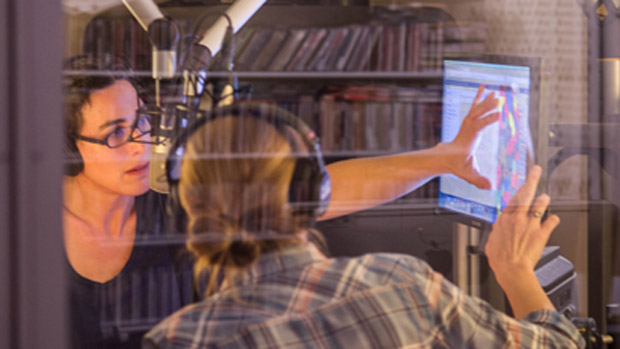Serial podcast: an 'ethical minefield' or the best podcast ever?
It has broken records and become a worldwide hit, but critics are worried about where the Serial podcast may be heading
Few podcasts have attracted as much critical attention as Serial, an American series trying to get to the bottom of a 15-year-old Baltimore murder case that the police say they've already solved.
Within a few episodes it had become a global phenomenon, and it has since racked up five million downloads more quickly than any other podcast.
Praise has been lavished on the series, with reviewers describing it as innovative and compelling: the New Yorker called it "the podcast we've been waiting for", and many commentators compared it to the hit HBO drama The Wire, also set in Baltimore.
The Week
Escape your echo chamber. Get the facts behind the news, plus analysis from multiple perspectives.

Sign up for The Week's Free Newsletters
From our morning news briefing to a weekly Good News Newsletter, get the best of The Week delivered directly to your inbox.
From our morning news briefing to a weekly Good News Newsletter, get the best of The Week delivered directly to your inbox.
But the show's sudden success has provoked an equally swift backlash. Critics accuse it of blurring the line between narrative fiction and reality, and of drawing the wrong kind of attention to the historical crime. After each new episode amateur sleuths are jumping online to try to crack the case themselves, sometimes revealing the identities and contact details of the real people connected with the case.
That has led a producer of the podcast to call for restraint.
"We really are still reporting out this story so we just want to caution against jumping to conclusions and certainly publicly accusing people of heinous actions," she told The Guardian. "I love the discussions … and think it's really incredible listeners are engaging with this story but, yeah, I have to admit I feel a pit in my stomach at the thought of anyone 'outing' real people or contacting them or anything like that."
However, even fans of the series have admitted to tuning in with a sense of unease.
A free daily email with the biggest news stories of the day – and the best features from TheWeek.com
"What is it, exactly, that people are participating in here?" asks Adrienne LaFrance in The Atlantic. "Are Serial listeners in it for the important examination of the criminal justice system? Or are we trawling through a grieving family's pain as a form of entertainment? These are questions much more easily posed than answered."
She also suggests that insufficient attention has been devoted to the victim: Hae Min Lee, a senior at Woodlawn High School in Baltimore County who disappeared on 13 January 1999 and was found a month later, strangled and buried in a shallow grave, in a city park.
Episode 9, released after her article was published, may have gone some way towards addressing LaFrance's concerns, with its gentle portrait of Hae as a teenager who loved Sprite, painting her fingernails just to pick the varnish off, and hanging out with her tight-knit group of friends.
But the primary subject of the Serial podcast is Hae's ex-boyfriend Adnan Syed, who was convicted of her murder, largely on the testimony of a friend known only as "Jay" in the podcast. Syed has consistently denied any involvement, and doubts about the case against him piqued the curiosity of Serial's host, Sarah Koenig, a former producer and occasional presenter of the cult podcast This American Life.
Although she spent months investigating the crime before the first episodes of Serial went live on 3 October, Koenig insists she does not yet know whether to believe Syed's denials.
Nevertheless, many commentators think they know where her sympathies lie. In the Daily Telegraph, Hannah Betts says that while Koenig's journalism is sound, her conversations with Syed reveal as much about her as they do about the prisoner.
"[Koenig] claims to be grilling Syed during their bi-weekly calls, but she is also enthused by them," she writes. "Even Syed appears to find it creepy when she tells him that he’s a 'really nice guy', adding: 'I like talking to you', telling her: 'You don’t really know me.' And she doesn’t. None of us do."
But in spite of her concerns, Betts says that Serial's experimental new format is both interesting and valid. "Serial is difficult in the way life is difficult," she says, "an ethical minefield, and utterly compelling."
-
 The battle over the Irish language in Northern Ireland
The battle over the Irish language in Northern IrelandUnder the Radar Popularity is soaring across Northern Ireland, but dual-language sign policies agitate division as unionists accuse nationalists of cultural erosion
-
 Villa Treville Positano: a glamorous sanctuary on the Amalfi Coast
Villa Treville Positano: a glamorous sanctuary on the Amalfi CoastThe Week Recommends Franco Zeffirelli’s former private estate is now one of Italy’s most exclusive hotels
-
 How roadkill is a surprising boon to scientific research
How roadkill is a surprising boon to scientific researchUnder the radar We can learn from animals without trapping and capturing them
-
 Serial podcast review: what we learnt from episode 11, Rumours
Serial podcast review: what we learnt from episode 11, RumoursIn Depth This week on the Serial podcast, Adnan says he just wants the scrutiny to be over
-
 Serial podcast review: what we learnt from episode 10
Serial podcast review: what we learnt from episode 10In Depth The Best Defense is a Good Defense, latest Serial podcast looks at Adnan's lawyer Cristina Gutierrez
-
 Serial podcast review: what we learnt from episode 9, To Be Suspected
Serial podcast review: what we learnt from episode 9, To Be SuspectedIn Depth This week on the Serial podcast, three new pieces of information appear to punch holes in the prosecution's timeline of events